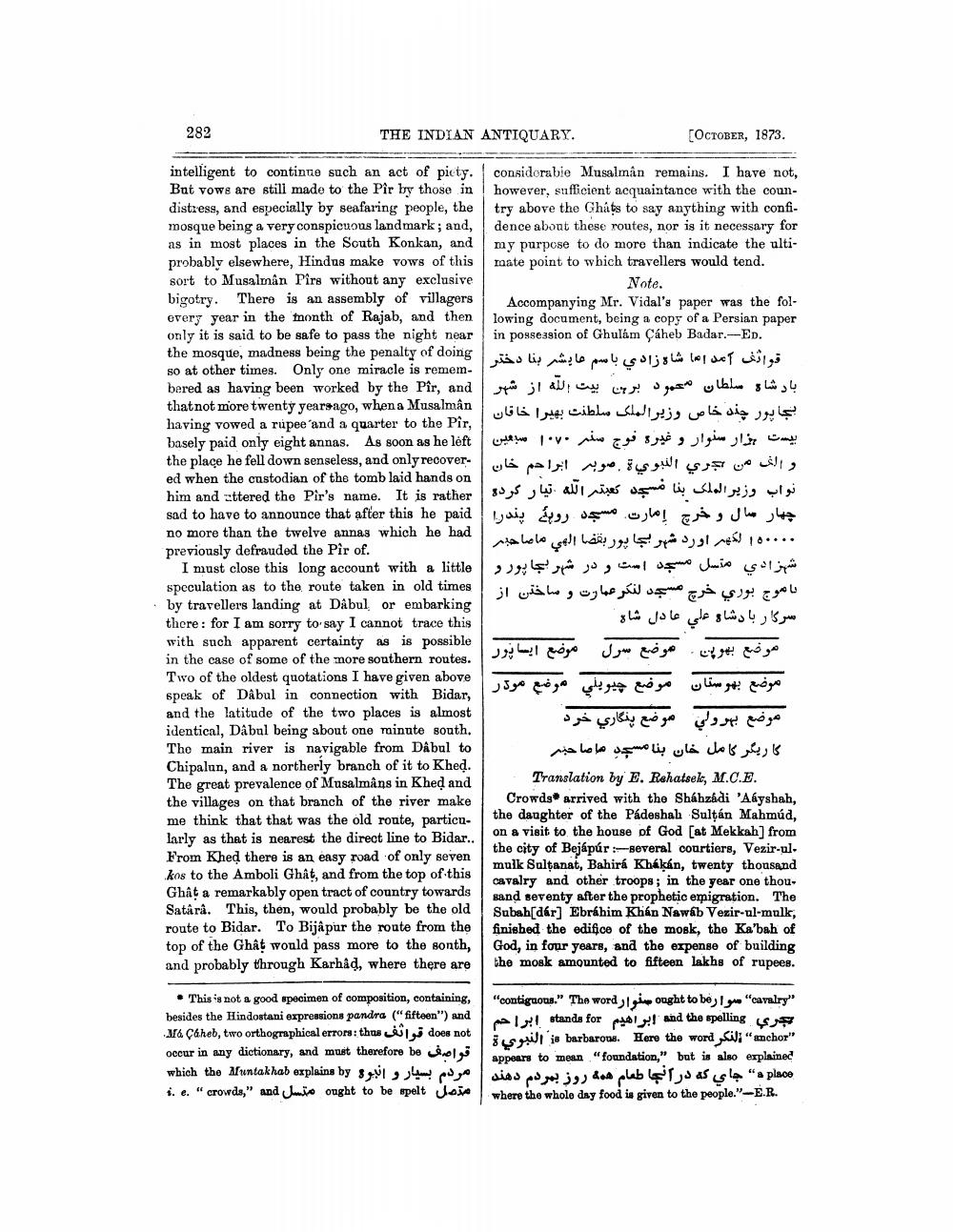________________
282
THE INDIAN ANTIQUARY.
[OCTOBER, 1873.
considerabie Musalman remains. I have not, however, sufficient acquaintance with the country above the Ghats to say anything with confidence abont these routes, nor is it necessary for my purpose to do more than indicate the ultimate point to which travellers would tend.
Note. Accompanying Mr. Vidal's paper was the following document, being a copy of a Persian paper in possession of Ghulám Çaheb Badar.-ED.
intelligent to continue such an act of piety. But vowe are still made to the Pir by those in distress, and especially by seafaring people, the mosque being a very conspicuous landmark; and, as in most places in the South Konkan, and probably elsewhere, Hindus make vows of this sort to Musalman Pirs without any exclusive bigotry. There is an assembly of villagers every year in the month of Rajab, and then only it is said to be safe to pass the night near the mosque, madness being the penalty of doing so at other times. Only one miracle is remembered as having been worked by the Pir, and that not more twenty yearsago, when a Musalman having vowed a rupee and a quarter to the Pir, basely paid only eight annas. As soon as he left the place he fell down senseless, and only recovered when the custodian of the tomb laid hands on him and uttered the Pir's name. It is rather sad to have to announce that after this he paid no more than the twelve annas which he had previously defrauded the Pir of.
I must close this long account with a little speculation as to the route taken in old times by travellers landing at Dâbul or embarking there: for I am sorry to say I cannot trace this with such apparent certainty as is possible in the case of some of the more southern routes. Two of the oldest quotations I have given above speak of DAbul in connection with Bidar, and the latitude of the two places is almost identical, Dabul being about one minute south. The main river is navigable from DAbul to Chipalun, and a northerly branch of it to Khed. The great prevalence of Musalmans in Khed and the villages on that branch of the river make me think that that was the old route, particularly as that is nearest the direct line to Bidar.. From Khed there is an easy road of only seven kos to the Amboli Ghât, and from the top of this Ghât a remarkably open tract of country towards Satârâ. This, then, would probably be the old route to Bidar. To Bijapur the route from the top of the Ghât would pass more to the sonth, and probably through Karhad, where there are
قواژن آمد اما شاه زادي باسم هایش بنا دختر باد شاه سلطان محمود برن بيت الله از شهر
وزير الملک سلطنت بهیرا خاقان بجا پور چند خاص بیست هزار سنوار و غیره فوج سنه ۱۰۷۰ سبعين والف من جري النبوي تصوير ابرا دم خان
بنا مسجد کعبتہ الله تیار کرده | نواب وزير الملک چهار مال و خرچ إمارت مسجد روہئی پندرا ۱۰۰۰۰۰ لكهم اورد شهر بجا پور بقضا إلهي ماصاحبير شهزادي متسل مسجد است و در شهر بجا پور و با موج بوري خرچ مسجد لنكر عمارت و ساختن از سرکار با دشاء علي عادل شاه
موضع ایسا پور | موضع بھوپن. موضع سرل
موضع چیوبني موضع موکر موضع بهر ستان
موضع بنگاري خرد موضع بهر ولي
خان بنا مسجد ماصا حبر کا ریگر کا مل
Translation by E. Rehatsek, M.C.E. Crowds arrived with the Shahzadi 'Abyshah, the daughter of the Pádeshah Sultan Mahmúd, on a visit to the house of God (at Mekkah] from the city of Bejápúr:-Beveral courtiers, Vezir-ul. mulk Sultanat, Bahirá Khákán, twenty thousand cavalry and other troops; in the year one thousand seventy after the prophetic emigration. The Subah[dár) Ebrahim Khan Naw&b Vexir-ul-mulk, finished the edifice of the mosk, the Ka'bah of God, in four years, and the expense of building the mosk amounted to fifteen lakhs of rupees.
This is not a good specimen of composition, containing, besides the Hindostani expressions pandra ("fifteen") and Ja çaheb, two orthographical errors: thus does not occur in any dictionary, and must therefore being
"contiguous." The word in ought to be, I gue "cavalry"
! stands for pd and the spelling y s
"mchor النگر ie barbarone. Homo the word النبوية
appears to mean "foundation,"
but is also explained!
مردم بسیار و انبرى by مwhich the Muntakhab explain
a place‘‘ جاي که در انجا طعام همه روز بمردم دهند
i. e. "crowds," and mio ought to be spelt love
where the whole day food is given to the people."-E.R.




